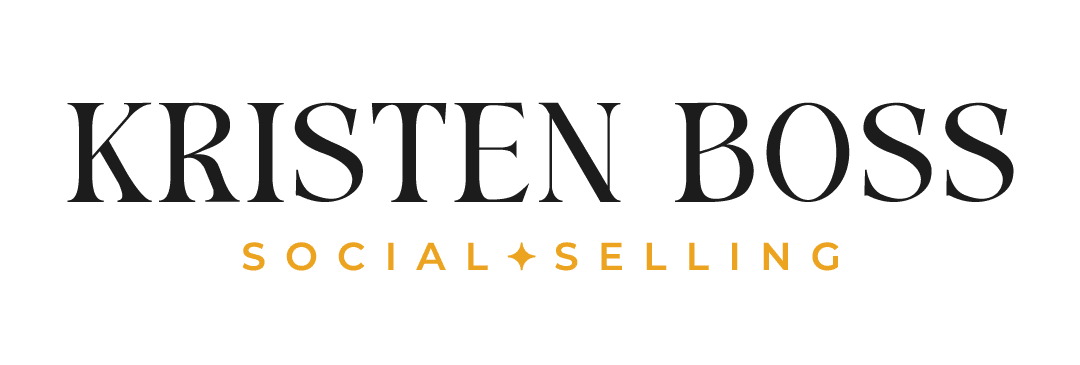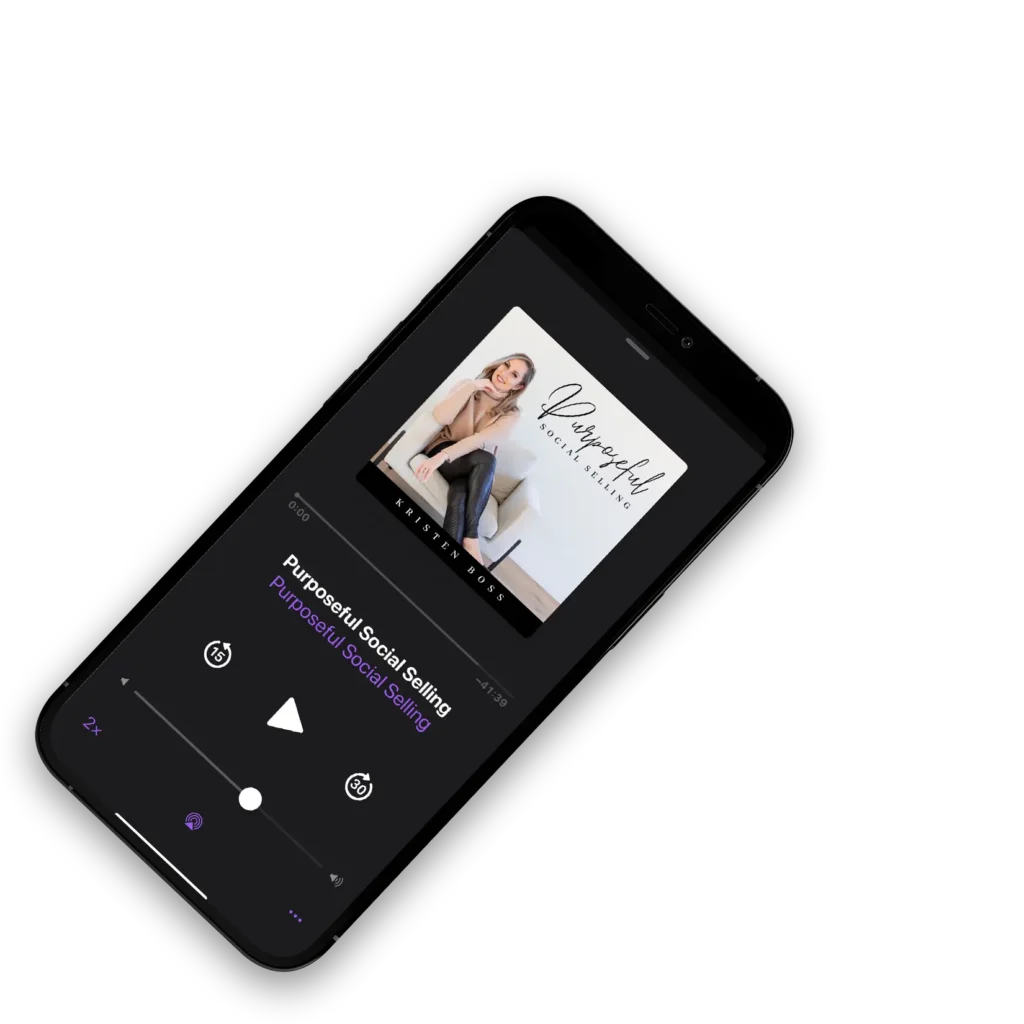We’ve all had a bad day, or a bad week. Heck, maybe even a bad month. Maybe you’ve contemplated jumping to another company, or quitting all together because it’s just not working. You may not know it, but there is real danger in how we talk to ourselves during those times of low belief and frustration.
In this week’s episode, Kristen is fired up about the untruths we tell ourselves when things aren’t working out. She talks about how our brains are wired to seek out problems, and how you can change the roadmap and earn true success. Without feeling guilty or ashamed.
So make sure you’ve got your big girl pants on this week, as Kristen gives us all a dose of tough love. Here are a few key points from this episode:
- Why Kristen wants to invite you to take the word ‘should’ out of your vocabulary
- How a negative mindset can show in your content (and scare off potentials)
- An explanation of what Kristen calls the ‘How Hunt’ and why problem solving from a negative space is less effective
- The importance of breaking the cycle of reaffirming negative thoughts
- How Kristen uses her evaluation process to help students find what is working
When things get hard, it’s easy to throw your hands up and scream that nothing is working. But when you calm down, evaluate the truths, and stop pointing fingers, you open the doors to meeting your true potential.
Thanks for listening!
Do you have a business full of customers and almost no builders? You’re in need of a reboot! Learn the three skills you can learn that will completely change your recruitment game. Check it out here.
If you’re ready to learn the simple process of running your social selling business online, you have to check out Kristen’s live group coaching program! The Social Selling Academy: www.thesocialsellingacademy.com
Do you have a question about network marketing? Kristen can help! Drop your question here, and she just might answer it live on the podcast: https://kristenboss.com/question
Interested in Kristen’s exclusive mastermind for six-figure earners in the network marketing industry? Get all the details and join the waitlist here.
Transcript of Episode #62: When it’s not Working
Kristen Boss (00:05):
Welcome to purposeful social selling with Kristen Boss. I’m your host, Kristen Boss. I’m a mindset and business coach with more than 15 years experience in both the product and service based industry. I believe that social selling is the best business model for people wanting to make an impact while they make serious income. This is the podcast for the social seller, who is tired of feeling and authentic in their business and desires to find a more purposeful and profitable way of growing their business in today’s social media landscape. In this podcast, you will learn what it takes to grow a sustainable business through impactful and social marketing. It’s time to ditch the hustle and lead from the heart. Let me show you the new way. Hey, my friends, welcome to another week of the podcast this week. You’re going to have to hear me with my raspy cold voice.
Kristen Boss (00:58):
I have been battling a weird mid-summer cold and I, it actually, it got so bad. I had to take a test and thankfully it was negative, but man, oh man, it has really kicked me. However, I sound much worse than I actually am. It just sounds nasally and it’s lingering. But here we are, was show up. We show up no matter what, right friends and also, I really just enjoy coming back week after week serving you. So this week, I really want to talk about a common phrase. I see too many gifted and hopeful entrepreneurs choose all too often in their journey. And that is, and it’s, I’m going to call it a default thought because it’s one that comes up a lot that you don’t even think to challenge. You don’t even think to question. You just believe it to be true. You believe it to be fact every time and the sane is it’s not working.
Kristen Boss (02:00):
This isn’t working for me. And I have seen people say this and every phase of their business, when they’re just starting out. When they’re years in, when they’re implementing something new, it is the first thought your brain is always going to offer you the moment you feel doubt. And when we feel doubt, that’s where I notice people will choose the thought it’s not working or something has gone wrong. And what they do is they don’t even think to challenge that thought they don’t think to stop and pause and ask themselves. What if this isn’t true? What if that’s not a fact because your brain loves to make sweeping generalizations when you are frustrated and you’re not seeing the results as quickly as you feel you should be seeing them. And I say the word should, because that’s the language a lot of people use when they evaluate the results.
Kristen Boss (02:57):
Like I should be further. I should have had more sales. I should have more followers. My teams should be coming to the calls. They just should themselves to death. And anytime with should ourselves. I just want you to notice, anytime you say, should, do you ever feel good? Do you ever feel better? Does it invite a warm and toasty feeling inside of you? When you say I should probably go and do that? I really should go and write a post. I really should go and add value to my audience. I really should go and check on my customers. I should go check on my team. Like notice how all of that is from this attitude of obligation of like, oh yeah, I probably should go do that. Like, it’s this painful chore or it’s. I also think when we should ourselves, it invites shame because it’s almost saying like we aren’t measuring up to a bar.
Kristen Boss (03:51):
We are holding for ourselves. And what’s interesting is we don’t even realize that we are the ones holding the bar. We think other people are holding the bar and that’s not actually true. True. Think about that many times. Do you think you’re trying to measure up to a bar and, and because of that, you’ve, you’re yourself. I, I should exercise more. I should go to bed earlier. I should wake up earlier. I should, you know, read 30 minutes a day. I should do more, more personal development. Like oftentimes we are shooting ourselves from a place of guilt, from a place of shame, from a place of believing that what we have done and what we are doing is not enough. So on that, I want to invite you to take should out of it. Language. When you speak to yourself about the work you were doing and, and honestly, even in motherhood and marriage and friendships with how you show up in life, just, I want you to notice this week.
Kristen Boss (04:58):
How often are you sure Dean yourself kind of sounds like a funny saying, right? But notice that. So when you, you’re thinking it’s not working, it often is from a place of like, I should be seeing better results. I should be doing those things. And the brain just defaults to, it’s not working. And the reason why the brain defaults to it’s not working. And there is a problem is because again, your I’m always talking about how you’re doing works at the primitive level and how you survived back in the day was your brain constantly looking for problems. So it would know how to anticipate problems, solve problems and keep you alive because what were problems, you know, thousands and thousands of years ago, when, you know, for cavemen, what were the problems? Then? The problems weren’t technology, the problems were food, shelter, clothing, water sickness predators, prey.
Kristen Boss (06:02):
Those were the problems. So the brain was literally trained to be on high alert, to always look for potential danger. And so when the brain is actually trained and wired to look for potential danger again today, I hope you’re not in a place where you’re thinking, you know, where’s the next meal coming from and food and shelter and predator and prey. You’re, you’re likely in a more evolved situation that your brain doesn’t understand the context. It really doesn’t. So because your brain is wired to look for problems, it’s always going to tell you what the problems are. It’s going to be so quick. I want you to notice how aware you are of all your problems all the time, unless you’ve learned to reframe your thinking differently. But when it comes to your business, how often do you find yourself sitting with everything? That’s not working everything.
Kristen Boss (07:00):
That’s frustrating, everything. That’s just not coming together for you. And you live in that. And it feels frustrating and it feels hard. And you try problem solving from that place. And I just want you to notice when you’re believing it’s not working, nothing’s working and nothing is as it should be. I want you to notice how you’re feeling when you’re thinking those things you likely are feeling defeated, frustrated, angry, upset. You’re judging yourself. You’re sad. You’re defeated. You feel helpless. You feel powerless. Like there’s a lot of feelings that come with the narrative of us, believing that everything has gone wrong and there’s there’s problems and things aren’t working. And so when we’re in that place, when we are believing that story, we actually get into what I call a how hunt it is. When you start, you leave what you’re doing and you start looking for solutions elsewhere, but you don’t do it from the right place.
Kristen Boss (07:56):
You do it from a place of panic, from a place of frustration, from a place of, I need to fix this from a place of judging yourself from a place of trying to get out of the pain you are feeling. And I just want you to notice that your problem solving actually becomes less effective when you’re problem-solving from this self-defeating place of nothing is working. This isn’t working in that really defeated. Like, and I want you to notice like the posture of your body when you’re thinking that I, when I picture somebody that’s thinking it’s not working like their shoulders are slumped there. Their head is kind of hunched forward and defeat. And they’re the energy in their body is just deflated. And what’s so interesting is when you have that energy, do you think you’re writing inspiring content that attracts new cutters? I guarantee you, you’re not because the energy we show up with is the energy we actually attract, you know, body language.
Kristen Boss (09:02):
And it’s so interesting. We may not see body language on the internet, but we can understand inflection and word choice that people use. When they write contact content, I can read someone’s content and typically read through superficial forest happiness. And I can, I can see through it and other people can too. It’s just like your audience is very smart. They can see forced enthusiasm. They can see you selling something you truly don’t believe in because of your use in language is different. You’re going to actually choose different words when you’re sitting in a place of low belief. But when you’re sitting in a place of high belief, and of course this is working in, of course, people want this. If you haven’t listened to the success, thoughts episode, go back and listen to that. But when you are believing those thoughts, what’s so fascinating is when you are writing your language changes, the word choice, you use changes in your content.
Kristen Boss (10:09):
That’s why when people say to me, but Kristin, I’m posting every day, I’m posting all the time. I’m adding value Kristin. And they kind of say it like from that frustrated, defeated, I’m adding value. And I’m like, blah, with that energy. No, one’s no one’s reading that. No, one’s reading that and buying it. No one’s saying, yeah, I’m here for this. I believe this she’s clearly here for it. She believes it. I’m all in. No, this is why the energy, this is why you going into what I call. And I joke about it in the academy, but it’s true. I call it robot energy. And it’s when you are in the should energy, I should go write a post. I should go and do this. And you just kind of robotically type. Like I love my product. Have you considered a business opportunity? You know what?
Kristen Boss (11:00):
I love this opportunity. I love this income. I love flexible nine to five posts. And it’s like, blah, like you walk away from the post and you know, the post I’m talking about, you walk away and you’re just like, blah, Liz. I have something out there instead of nothing. And what’s interesting is I, I do coach people on posting messy work. I encourage people to post B minus work. I, I encourage people to, to post authentically and with imperfection, but from a place of belief. But if you’re posting messy and posting with imperfection and you think you’re, you’re thinking one post is better than no post, but your belief is in the crapper that post really, it’s not going to transfer to your audience. They’re not going to buy it. They’re not going to read it and be like, yeah, I believe what this person is doing.
Kristen Boss (11:54):
So when you’re saying it’s not working, you’re actually creating that reality for yourself because you’re in robot energy, you’re shooting yourself. You’re going online. And you’re like, oh, Hey, I’m here doing the things help. You want to come and do business with me. Like, I want you to notice how often that energy is coming off for you, where you’re in this forest activity and you have no belief. This is why I tell people when they ask me, they’re like, Hey, can I just have your, your workbooks that you saw in the academy? Can I just have those? I’m like, why, why would you want the workbook so that you can turn into a robot? Why do the action? If you have no belief, if you have no belief, the action doesn’t matter. That’s why coaching along with strategy is so powerful. This is why I teach my students to self coach and to learn, to change the narrative in their mind, that’s directing their behavior.
Kristen Boss (12:51):
Listen, everything you do is from a thought you have, whether it’s a good thought or a bad thought. Every result you you create in your business is from how you are thinking. And if you were thinking, of course, this works. I have so much belief in this. This is the best industry. This is the best business model. This is the best offer in the world. And people would be absolutely insane to not take advantage of this. That is going to come across in your content, because you’re going to say things differently. You’re going to use sentences. That sound that come from conviction. People are going to read the con conviction in your words. But if you’re not convicted that this is the best business and you have the best offer and people want this, don’t expect to write convicting content. Don’t expect to write compelling content where people are like, sign me up.
Kristen Boss (13:41):
I’m excited as I try not to like cough, but seriously, don’t expect that. So notice just how sneaky the same it’s not working and what it’s not working creates for you. You end up going out on a how hunt. So one, you could become the robot and be like, it’s not working, but I’m still going to do the B activity ma and have an attitude about it. And then continue to see a lack of results that reinforces your belief. Oh, it’s not working. I knew it. I knew it’s not working. Remember your brain is always working to prove a belief you have as true. It’s how it keeps you alive. Your brain is always looking for evidence. That’s why some people get really frustrated when they try and find a new belief or they try and wire a new thought and they expect themselves to believe it immediately.
Kristen Boss (14:40):
It’s kind of like affirmations. Like they, they say the words and no transformation happens because they actually don’t believe it. And they don’t know how to believe that thought. And they get upset that they’re like, why, why don’t I believe this? And the reason is, is because the thought you currently believe is true. For example, if you believe it’s not working, that thought feels more true to you. Why? Because your brain has been working to collect evidence to make that true for a lot longer. So when you present a new thought, imagine that as a new case that you are bringing to your brain and your brain is like, we don’t buy it because look at this mountain of evidence that it’s not working, but what you must do when you want to really embed a new thought is you have to force your brain to acquire the evidence.
Kristen Boss (15:35):
You can’t just expect your brain to, to magically latch onto a thought and say, I believe that, oh, thank you. Thank you for that new thought. What a magical happily ever after. And now I believe every day that everyone wants my offer, no, you always have to go to work, to collect evidence. How do you collect evidence? You have to ask yourself first, what is working? How is this working for me? And you have to sit your butt down, write it down, actually force yourself to come up with answers. Even when your brain is shouting at you in the background. No like your brain is shouting a liar. We have all this evidence that this is not true. I am sitting on a mountain of irrefutable evidence that this in fact does not work. And here you are, you have to sit down and you have to write down, how is this working for me?
Kristen Boss (16:26):
I want to tell you something. I teach my students and evaluation process. And one of the things you have to ask yourself, always, no matter what, when you’re looking at your business, when you’re looking at your activity, you have to start asking yourself, you have to start the conversation with what is working for me and force yourself to answer it. Even if your brain is fighting you, because it will. Why? Because it’s wired to look for everything that’s going wrong, because it believes it’s doing its job. Keeping you alive your brain. Isn’t programmed to look for everything. That’s hunky Dory and going well, it’s not. So, but here’s the thing. When you start there, you start from a positive place. You start with evidence of belief. And here’s what happens when your brain is in a positive place. Are you ready for this? It becomes 30% more effective.
Kristen Boss (17:19):
So remember when I was saying earlier, when you are believing, it’s not working and you feel defeated and you go and problem solve from that place. You’re, problem-solving from a place of frustration. But when you are, when you start with what’s working and then you approach and evaluate your business from a place of curiosity and send a place instead of a place of judgment and frustration and be like, it’s absolutely not working, blah, blah, judging myself, judging others, judging people, judging the process. Judgey judge, judge. Right? And like I said, when you’re in that place of judgment, your problem-solving is far less effective because you’re doing it from a frustrated place. When you are curious, when your brain is positive, you’re actually going to look for solutions from a completely different mindset. You’re going to find a creative strategy to address what might not be going optimally.
Kristen Boss (18:22):
But what you’re not going to do is an very few people problem solve from that place. Very few people problem solve from the place of here’s what’s working. Here’s what I feel good about. What might we be able to do different here to improve this without feeling judgment, without feeling shame, without feeling criticism and that defeat they’re able to come up with really amazing solutions, but most people problem-solve from, it’s not working. And this sucks. I suck. Everybody sucks and the business sucks. And then they expect to go and find a solution. And that’s when I that’s, when they go on to how hot they look for the next course, the next coach, the next they look for another company, they look for a different upline. They look for a different training. They look for the silver bullet and they go into this frantic energy of surely something must work when they don’t realize they themselves are the problem because they have a bad attitude because they go out there and they expect things to happen overnight.
Kristen Boss (19:30):
Just like that. Like I’m going to do this strategy and it’s immediately going to come to fruition. And it’s all going to be rainbows and unicorns and daisies. Listen, it takes a while to grow an audience. It takes a while to build trust. And if you want to play the long game, you have to, you have to build trust. You have to be patient, but here’s, what’s interesting. The brain loves to make sweeping generalizations. It loves to be dramatic. It loves to use very vague terms. Like none of it’s working, it’s not working. It’s like, that’s why when I coach someone, I say, what’s not working. What exactly is not working? Because when we say it’s, we’re just doing a sweeping generalization of like the business myself, the team, the whole thing is not working. And when we make that really vague, sweeping generalization, it heightens the, our experience and our feelings about it.
Kristen Boss (20:28):
Like it blows up the problem. Everything’s a problem, right? Instead of like, oh, well actually it’s this one thing. So, and then you have to ask yourself, is that actually true? Or am I just having a bad day? Why am I allowing myself to choose this thought, by the way you choose that, when you think it’s not working, you are choosing that thought your brain offers it. And you can choose in that moment. If you want to throw it in the bin and say, no, thank you brain. In fact, here, I’m going to go give you all the evidence of why it is working. So you can just take a seat, right? You can, you can do one of those two things. So you have to ask this, this is actually true. And how is this not true? And what’s really interesting. As most people say this too soon, they’ve barely given it enough time.
Kristen Boss (21:24):
You haven’t failed enough to say it’s not working. Like I, again, I’ve told this story so many times, like I did so many launches of this, of the same course, and it was fail, fail, fail. And it wasn’t my audience in the course that didn’t work. It was me. I had to get better. I had to improve. I had to build trust, but I didn’t scrap it and say, screw it. This offer doesn’t work. This doesn’t work. Nobody wants this. I just kept showing up. And I put in the time, what I want to ask you is when you actually not what I want to ask you, what I want you to ask yourself when you’re thinking it’s not working, right? You need to ask yourself, how long have I actually been doing this fully committed. All in doing the work, being consistent. You have to ask yourself, how long have I actually been doing this?
Kristen Boss (22:19):
Because your brain wants to tell you forever. It wants to make a really sweeping generalization. We’ve been doing this for so long, so long, and we’ve seen no results and it’s not working. This is why your brain does. It’s very dramatic. And it makes big sweeping generalizations, like nothing is working. And I’ve been doing this forever. I’ll never forget when I was, I was on a group zoom and everyone was telling me this was early on. And everyone was telling me, I make offers for the business. I yup. I do it. And no one’s biting. So I immediately, I was like, you know, I’m going to call their bluff. I’m going to call BS here. But however, I don’t think they were intentionally lying to me. I knew they were lying to me. What was so fascinating was I think they were not, not consciously lying to themselves, but I think they were making a sweeping generalization in their brain.
Kristen Boss (23:12):
That was like, I make offers all the time. Kristin, I make offers all the time. So in that moment I was like, you know, let’s get really specific. I want everybody to pull out their phones and I made everybody do it. I said, I want you to scroll back to the last time you made a powerful call to action about your business. It was fascinating on that call. I think the person that had the most recent call to action was more than 14 days prior, two weeks ago. But their brain was like, I make calls to action all the time. And then I asked him, okay. And some people were like, it was 45 days. And then I asked him, okay, no, go to the one before that. And again, it was like 10 days, one days it was so infrequent. But the story, their brains were there, their brain was telling them was I do this all the time. It must not be working. But when I challenged it and said, how long have you been doing it? When was the last time you’ve done it? And how long has it been in between calls to action? They realized, oh, I actually haven’t been doing it that much. I actually, I haven’t been making consistent calls to action. Oh. So when you realize that, when you realize I haven’t been making consistent calls to action, is it actually fair to say it’s not working because the truth is this is going to sting a little bit.
Kristen Boss (24:47):
It only works if you do. It’s not that it’s not working. You’re not working. You’re micro, quitting on yourself all the time. You’re spiraling. You’re in a tailspin. You’ll get to that post another time. You’ll get to this another day. I’ll revisit my business in the summer or in this, in the fall. When the kids go back to school and my time is more organized and I’m not on vacation, I’m calling y’all out. Why? Because I actually really care. And I’m tired of seeing people quit on themselves. It like it, it’s painful to watch as a coach, it’s painful to watch people take easy street and then whine. When they don’t see the results for taking it easy street, life changing money is not on easy street friends. It is on the hard gritty. Want to give up, knocked on your butt a million times avenue.
Kristen Boss (25:41):
And if you want to have a life-changing legacy and a life changing business, you’re going to have to go down that road and you have to keep going down over and over and over again. You’re going to have to not believe your brain every time it wants to make this sweeping generalization that you suck and you should, and it’s not working. And it’s probably better over there. And there’s a management strategy over there, or a unicorn comp plan over there, or, you know, a, a ground floor thing over there. There’s always going to be a shiny promise that it’s the easy street is better, but I I’ve worked with hundreds of thousands of entrepreneurs who take easy street and they are not where they want to be. Every person I’ve met, who’s made life-changing money and done a life-changing business and they’ve, and they’ve created a legacy of their dreams.
Kristen Boss (26:30):
None of them would tell you, they took, took easy street and they would also tell you, there are many times that they were so tempted to believe that it’s not working. It felt so believable. And they chose to say that thought is BS. We move on and let me find all the ways this is working. And let me, let me show up and I’m going to be working. I’m going to work no matter what, right? It’s leaning into the hard work, hard work. Isn’t just what you do. Hard work is being willing to think new thoughts and do the hard sweat equity of going out and gathering all the evidence to build a new thought and make that belief true. When your brain is, has too much evidence on a default thought, that feels way more true. That’s how most people live their lives. Sitting on a mountain of evidence with their default thoughts that they sit with at night, believing my success is impossible for me.
Kristen Boss (27:33):
And here’s all the evidence why everybody who has massive success or people that say, I don’t have evidence for how I’m going to be the most successful person in the world, but I’m going to go out and build some. I’m gonna go out and find evidence until it’s true until I’m sitting on a mountain. That’s bigger than the other mountain I used to sit on. Are you willing to do that work today? Are you willing to go out and build new beliefs and find new evidence and show up and do the work and not choose the thought it’s not working? It is a cop out thought, woo y’all didn’t expect fiery coach today, but I am bringing it. You cannot choose that thought because when you think it’s not working, guess what happens? You stop working. The cycle has got to stop and it stops with what you allow in your mind with the thoughts you entertain. And you need to learn to put the pause button on and say, whoa, hold on, hold on. That’s a thought I can choose it. I can choose not to believe it. And I could choose to go out
Kristen Boss (28:46):
And create a mountain of evidence for different reality. I want to create for my life. I hope you do that today. We’ll catch you next week. Friends, that wraps up today’s episode. Hey, if you love today’s show, I would love for you to take a minute and give a rating with the review. If you desire to elevate the social selling industry, that means we need more people listening to this message so that they can know it can be done at different way. And if you’re ready to join me, it’s time for you to step into the social selling academy, where I give you all the tools, training, and support to help you realize your goals
Kristen Boss (29:25):
In the academy. You get weekly live coaching so that you are never lost or stuck in confusion. Whether you are a new in the business or been in the industry for awhile. This is the premier coaching program for the modern network marketer go to www.thesocialsellingacademy.com to learn more.










